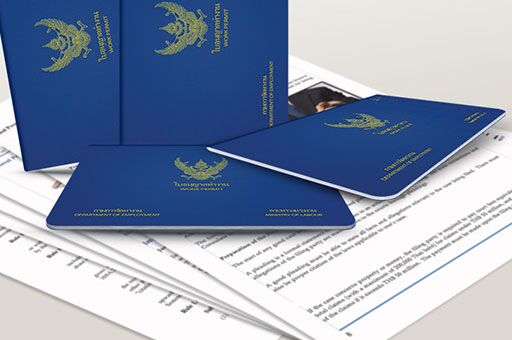Documents needed when registering a company in Thailand
Obtaining a Non-immigrant Visa
If you want to work in Thailand, you need a work permit. However, before you can apply or be issued a work permit you must have a non-immigrant visa. This is required to apply for a work permit. Ideally, it should be acquired prior to your arrival in Thailand. Law firms like Siam Legal International can assist you in obtaining it in your home country or in a nearby country near Thailand. In addition, they can help you convert a tourist visa to a non-immigrant visa inside Thailand but it can take up to 1 or 3 months for this conversion process.
Requirements for getting a non-immigrant visa outside the country:
- The applicant has been offered a job or starts a Thai company to employ himself/herself
- The company requests that the applicant be given a non-immigrant visa so the company may apply for a work permit for him/her
- The company knows the person to be dependable, upstanding, and law-abiding and that they will respect the laws and customs of the Kingdom of Thailand.
- You should apply for this visa within 30 days before you plan to depart your country. The Consulate or consular officer will ask for copies of the registration documents and financial statements from the company
Obtaining the Work Permit
Employee provided documents:
- Passport – copies of every page. Each copy must be signed by employee.
- Non-Immigrant Visa
- Departure Card TM.6
- Education degree (signed copy) *
- Transcript (signed copy) *
- Certificates or licenses held by applicant (signed copy) *
- CV or Resume – describe in detail the applicant’s past positions, duties, performance, length and place of employment.
- Photos, three (3) in quantity which are 5 x 6 centimeters in size (not passport photos) with full face and taken wearing business attire (no hat and some jurisdictions require suit and tie). Must have been taken within six (6) months.
- Marriage Certificate (if married to Thai National). This includes the original and signed photocopies. Also include wife’s Thai ID card, birth certificates of children, and household registration.
* Thai government officials may require these documents to be certified by your country’s embassy (this requires bringing your degree, resume, license, or certificate to your embassy to declare it is a true and original document. You are required to pay an authentication fee to your embassy. In addition, they can require you to translate these documents into the Thai language from your foreign language.
Employer provided documents:
- Commercial Registration Department Certificate showing that the organization for which the applicant is going to work has been duly registered as a juristic person, giving the name of the Managing Director and/or Director, and its objections and registered capital.*
- Shareholders List certified by the Commercial Registration Department.*
- Factory License (if required) issued by Factory Department, Ministry of Industry.*
- VAT Certificate – Phor Phor 20*
- Withholding Tax – Phor Ngor Dor 1 (if renewing work permit)*
* Thai government officials require that all documents must have the seal of the company stamped on every page and the true and authorized signature(s) of the Managing Director and/or Directors next to the seal. In addition, government officials have in the past requested official copies of registration, shareholder, licenses, and certificates to have been issued by their respective agencies within the past 90 days of your application for work permit.
Getting the Work Permit Approved
A job description is often the determining factor in the approval or denial of a work permit. Unless the written job description requires skills that a Thai is not likely to possess, the application will not be approved. Our licensed lawyers are skilled in writing professional and accurate job descriptions in order for you to gain quick approval. The Labor Department often seems to want to reduce the number of permits actually issued to help demonstrate that they are protecting Thai jobs. Therefore if your company applies for three permits, they may only approve one or possibly two. You need professional help in ensuring all of your applications will have a successful outcome.
Signing for Your New Work Permit
Your first and only appearance for the work permit will be at the Labor Department upon its approval. You must appear in person with your passport and sign the work permit book in the presence of the Labor Department staff. The Labor Department puts a stamp in the back of your passport at the time of receipt.
Restrictions on Your Work Permit
The work permit once approved allows you to work at the noted company and location. If you change employers or places of work, you must make a new application. Also if you resign or are terminated or laid off, according to the law, within 10 days of this, you must return your work permit to the Labor Department. Don’t count on your company doing it. It is your responsibility and you are liable to return it to the Labor Department.
The Tax ID Card
Once your work permit has been arranged, the next step is for your company to apply for a Thai taxpayer identification card. This ID card has a tax ID number which you will need to list on tax documents.
Extension of Stay vs. Re-entry Permit
“Visa” is issued outside of Thailand by a Thai Embassy or Consulate in which you request entry into the Kingdom of Thailand. Once allowed to enter the Kingdom, the Immigration Officer will stamp the date in your passport. This is referred to as your “Extension of Stay.”
“Extension of Stay” is the time period you are allowed to remain in the Kingdom of Thailand. This is typically the date stamp in your passport by the Immigration Officer either after arriving in the Kingdom through a border checkpoint or issuance by the Immigration Police after a request for an extension of stay.
Many people misunderstand the difference between an extension of stay and re-entry permit much to their own disadvantage. Here is the key point: your “extension of stay” stamp is the controlling date. Everything is dependent on this date. While your re-entry permit allows you to get inside and outside of Thailand either once or many times depending on the type of re-entry permit you have.
Your re-entry permit is only valid until the date stamped in your passport to leave the country. Any re-entry permit you obtain will expire when your “extension of stay” expires. If you depart the country without a re-entry permit, your “extension of stay” is invalidated as well as your work permit.
This is the key distinction so after going through the process of getting a longer period of time for your “extension of stay” and work permit; please ensure you have a re-entry permit before departing Thailand. Siam Legal International can assist you to obtain a single re-entry entry permit (one time use) or multiple re-entry permit (unlimited use until visa expiration date).
Renewing Your Visa and Work Permit
Your Work Permit expires when your Extension of Stay does.
You will need to renew your stay in Thailand before you can renew your work permit. This can be done in Thailand or in some cases you must leave the country. If you cannot obtain your extension inside Thailand, you will have to get a new non-immigrant visa from a Thai Embassy or Consulate abroad as explained above. If you have an unexpired multiple-entry visa, all you have to do is go over the border and then return. If required to go outside Thailand to obtain a new visa, you will need to provide the Embassy or Consulate with copies of your work permit and a new recommendation letter from your company, company registration documents, and financial and tax reports. Siam Legal International with its global presence can assist you in any country with renewing your visa. Again, all of this must be done prior to your work permit expiration.
Reporting your Stay every 90 days
You are required to report to Immigration Police every 90 days for persons on a long term extension of stay. Persons holding a multiple entry visa will simply depart Thailand and renew their extension of stay after each 90-day entry.
Contact Us
Get in contact with our corporate lawyer in Thailand to learn more about the process. Our team of legal experts will make sure that the entire process of registering your company in Thailand goes smooth for you.

LEAVE US A MESSAGE
For information and assistance on how to start your company in Thailand, please fill out the form below and send it to us.




































